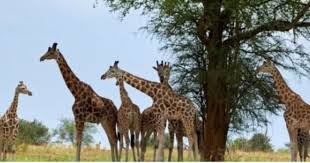Following the rising water levels of Lake Baringo, The Kenya Wildlife Service (KWS) and Ruko Community Conservancy have been forced to move two Rothschild’s giraffes from Longicharo Island in Lake Baringo to the mainland.
Approval to translocate the giraffes to a purpose-built sanctuary was granted by the KWS after the lake started encroaching on the island by an estimated six inches a day.
The giraffes are being moved in a rectangular barge that is custom-built out of steel and designed to float on a series of empty drums that provide buoyancy. It has tall, reinforced sides to keep the giraffes from jumping out during towing.
Lepariao Robert Lokichar Conservancy Chairman said that the rising water levels has forced them to relocate the giraffes since that most of the grazing fields for the animals have been submerged by water threatening their survival.
Lake Baringo warden Jackson Komen said that the lake has increased by 88.6 percent and it has also affected the tourism sector since most of the tourist facilities around the lake have been submerged.
Bernard Rono KWS Veterinary officer explained that the translocation process is not easy and they have to drug the animals, cover their eyes before tying them with ropes all over the body.
PS State Department of Wildlife revealed that his ministry is dedicated to protect wildlife at all costs at the same time he appealed to members of the community to take part also in taking care of wild animals and also conserving the environment.
He added that out of the eight giraffes in the island, two are pregnant and they will have to wait for sometime before they are translocated to the main land.
He assured Kenyans that the government will try its best in solving human wildlife conflicts which has led to losses of lives also at the same time, he called upon those who have been victims of human wildlife conflict to fill compensation forms.
The giraffes have also faced challenges in breeding. Out of eight calves born, only two have survived the wilderness. The others are thought to have been lost to python predation, nutritional deficiencies and other natural causes.

